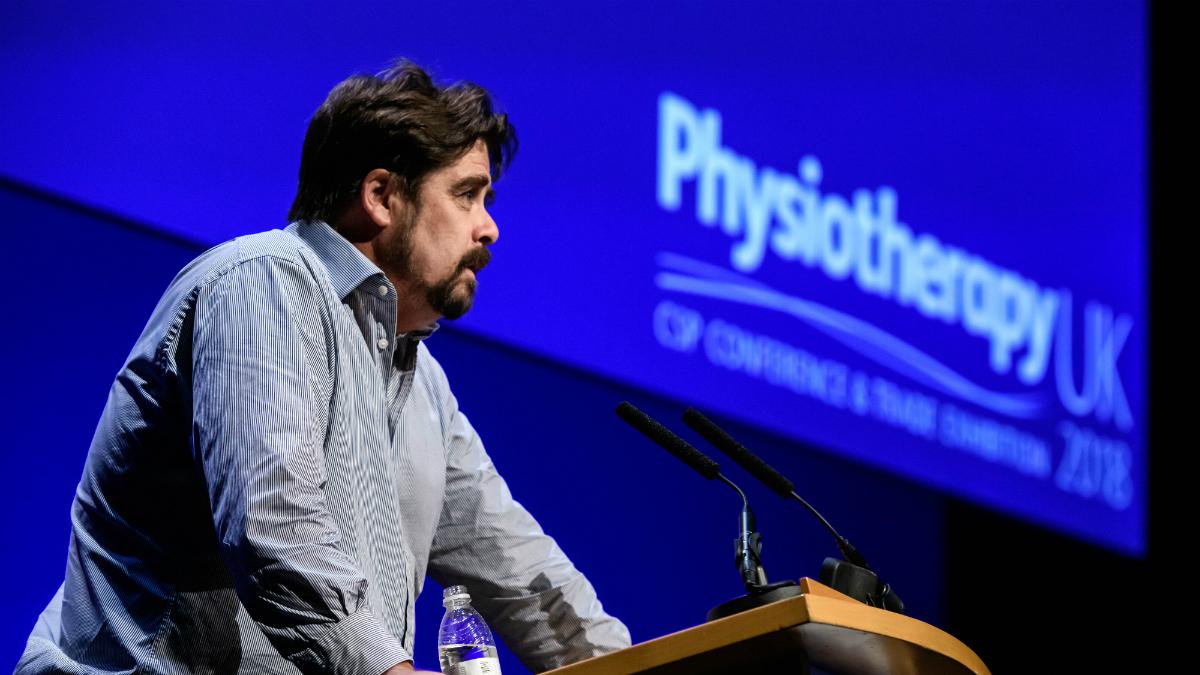As the number of older people increases, physiotherapists should proudly promote themselves – as they have a vital role to play in helping people age well and stay well.

This was one of the key messages from David Oliver, clinical vice-president of the Royal College of Physicians, giving the Founders Lecture at Physiotherapy UK in Birmingham today.
During his presentation Professor Oliver, who also works as an NHS consultant in geriatrics and general internal medicine at the Royal Berkshire NHS Trust, emphasised that physiotherapists should raise their profile, as he spoke about why health and care services need to adapt in response to a rapidly ageing population.
‘Physiotherapists are too modest about their contribution to research, skills and knowledge, clinical care and multidisciplinary teams,’ he said.
‘Yet they are often in service and system leadership roles and involved in education, innovation and advocacy.
‘And the CSP has done some great campaign work, like its work on falls prevention and interventions in the community for instance. So I think you, as physiotherapists, need to bang your drum more.
‘Doctors are usually quite assertive and nurses have strength in numbers, so generally when you see healthcare reported in the media the focus is on doctors and nurses. But I am a big fan of physiotherapists.’
Workforce implications
Professor Oliver went on to talk about the ‘spectrum of ageing’, ranging from healthy active ageing to people living with severe frailty, and he outlined how quickly the population was ageing and how this would affect healthcare services.
‘When the NHS was founded 48 per cent of the population died before they got to 65, now that figure is only 12 per cent and the fastest growing segment of the population is people over 80.
‘Over the next 20 years, the number of people over 80 will double and there will be a quadrupling in the number of centegernarians.’
In addition, he said that falling birth rates and potential curbs on immigration meant that the proportion of traditionally 'working age' adults to older people may also fall.

‘Across all the health professions, this will create a workforce challenge,’ Professor Oliver explained.
‘So we need to train more students, we need to make it easier for clinicians to come and stay here [in the UK] and we need to retain people by not allowing them to burn out and by supporting them later in their careers.’
He added, however, that an ageing population should not be viewed as a ‘doom and gloom’ narrative and highlighted the importance of recognising the continuing contribution of older people.
‘It’s not all bad news,’ he said.
‘Ageing is a success story for public policy and medicine. It’s a victory for better societal conditions, like housing and diet, better public health and prevention and better healthcare.
‘And we should stop representing older people as a burden or a drain. Older people make a big contribution to the economy.’
Changing language and perceptions
Professor Oliver highlighted the dangers of unrealistic representations of older people, and the use of ageist and ‘catastrophising’ language.
‘There is ageism in the health profession, in society in general and in the media, he explained.
‘We are presented with polarised representations of skydiving grannies versus vulnerable victims. When what we need are realistic representations of ageing, where someone may have a walking or hearing aid, or a bit of early cognitive impairment, but they are still valuable and value members of society.
‘And we’ve got to stop using language like the “grey tsunami” of older people washing towards us, the “ticking time bomb”, the “burden of ageing” and “the elderly”, which makes it sound like everyone from 65 to 100 is one amorphous mass.’
He added that similarly unhelpful terminology often crept into healthcare, with the use of language such as “acopia”, “off legs”, “social admission”, “bed blocker” “failed OT assessment” and “no rehab potential”.
Rehabilitation should be a ‘core business’
Professor Oliver said that treating older people with multiple co-morbidities will increasingly become the norm for physiotherapists and other health professionals. As a result, there was a need to focus on improving prevention and service provision for people with complex multi-morbidities, increasing rehabilitation services and moving towards more person centred care.
‘Rehabilitation needs to be a core business right from the community through to the acute front door of the hospital and the back door and beyond,’ he said.
‘We have long-term care issues, with 400,000 people in nursing residential homes – but they often don’t get very good access to allied health professions at all.
‘I think we are missing a trick there, as there are people in residential care homes who, for the sake of a bit of rehabilitation, might be able to stay there but then they are admitted to hospital and never go back.
‘We are too geared towards acute, too hospital centric and too doctor dependent. Care is episodic and disjointed, it’s reactive and disease focused. Patients are too passive, self-care and carers are undervalued and it’s low tech.
‘So we need to move towards prevention, coordination, supported self-management, continuity of care and patients as partners.’
He added that physiotherapists were already providing a valuable contribution in public health, local government and the voluntary sector, by helping people live well with long-term conditions, such as COPD, chronic arthritis or chronic neurological conditions.
Find Out More
Number of subscribers: 2